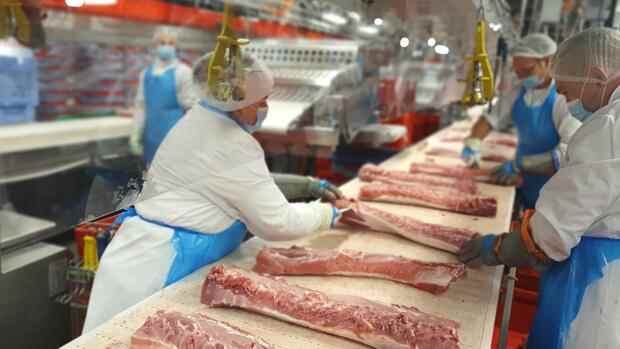Since January 2021, work contracts in slaughtering and cutting have been prohibited. Tönnies is now increasingly recruiting its own employees in south-eastern Europe.
(Photo: dpa)
Dusseldorf Ironically, in the 50th anniversary year, Germany’s largest meat company Tönnies suffered significant losses. The turnover of the family business fell by twelve percent to around 6.2 billion euros in 2021, as the Handelsblatt learned in advance. The group generated half of this abroad.
Revenues had already fallen in 2020. However, only slightly by three percent, although the main plant in Rheda was forced to close for around four weeks due to a corona outbreak.
“The year 2021 was not satisfactory for us,” states Clemens Tönnies, managing partner of the group. The entire meat industry in this country struggled with a drop in sales. Tönnies sees the low producer prices and the sharp drop in animal numbers as the cause. In the meantime, the industry has been able to push through higher prices in retail.
Pork prices have been extremely low for many months. Because since the outbreak of African swine fever in Germany, the lucrative export to Asia has stopped. This means that there is no important sales market for the holistic marketing of animals for mustaches or paws. The result: “More and more pig producers are getting out of the loss-making and hopeless business,” reports Klaus Martin Fischer, industry expert at the Ebner Stolz consultancy.
Top jobs of the day
Find the best jobs now and
be notified by email.
The slaughter companies designed for mass lack the utilization. “We are extremely under water, in deep red numbers – and not just Tönnies, but the entire slaughter and cutting industry,” said Tönnies in 2021 in an ARD program. The family business traditionally does not comment on concrete profits or losses.
Competitor Westfleisch made a loss of twelve million euros in 2021, and sales fell by a good nine percent to 2.56 billion euros. According to Tönnies, despite the difficult year, it was still able to gain market share.
“We don’t shed any tears for the work contract”
Work contracts have also been prohibited in the meat industry since 2021. A tour de force for companies like Tönnies. “But we don’t shed any tears for the work contract. As an industry, we’ve held on to it for too long. That was definitely a mistake,” admits Tönnies. The subcontractors were criticized because of the precarious situation of many contractors from Eastern Europe.
Tönnies only uses its former service providers to find workers. “We want to put that behind us and stand on our own two feet,” says Martin Bocklage, Managing Director Human Resources.
The company has now set up its own placement offices in Serbia and Poland, with others to follow in Romania, for example. Recently, the group was criticized because Ukrainian refugees were offered work and accommodation directly at the border. The recruitments were then stopped.
>> Read also: Clemens Tönnies breaks with Putin: “I was wrong about him”
Despite the difficult market situation, Tönnies invested a three-digit million amount in sustainability and automation in 2021. “Efficiency and sustainability are not contradictory,” says Gereon Schulze Althoff, Head of Quality Management and Sustainability. Around 50 percent of all animals for slaughter today come from forms of husbandry that exceed the legal norms.
Tönnies is working with the environmental organization WWF on a deforestation-free supply chain for soy feed. Petroleum-based packaging was reduced by around 35 percent. The organic and plant-based meat substitutes are also growing strongly.
More: Meat industry sees existence threatened – Tönnies & Co. call for higher prices
